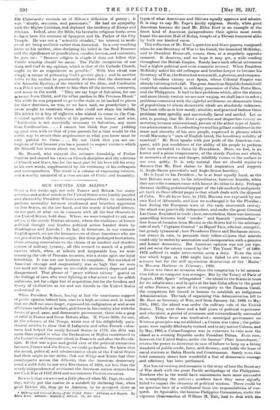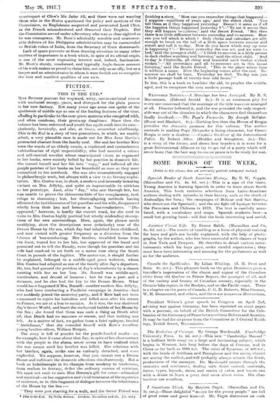OUR COUSINS AND ALLIES.*
ONLY a few weeks ago, not only France and Britain, but many generous and ardent minds in the United States were frankly puzzled and alarmed by President Wilson's scrupulous efforts to maintain a perilous neutrality between unashamed and heartless aggression on free States, on the ono hand, and the sturdy if belated defence, on our part, of what we, in common with all the best. elements in the United States, hold dear. Whore, we were tempted to ask our- selves, is the sturdy Puritan element, where the traditions of honest political thought and fearless political action handed down by Washington and Lincoln ? In law, in literature, in our common English speech, we are the kinsmen even of those Americans who are not proud of an Anglo-Saxon origin. But these prolonged hesitations, these seeming concessions to the claims of an insolent and obsolete eystem of military tyranny, all this seemed to smack of a politic caution which, when, at infinite and irreparable loss, we were stemming the tide of Prussian invasion, was a strain upon our loyal friendship. It was not our business to complain. But our ideal of American courage and magnanimity was so high that we wore . (we need not now disguise an inevitable sentiment) depressed and disappointed. That phrase of "peace without victory" grated on the feelings of men who were fighting, at what a cost ! not for selfish ambitions, not for vulgar lust of acquisition, but for the freedom and liberty of civilization as we and our friends in the United States understand it.
When President Wilson, having at last the unanimous support of public opinion behind him, rose to a high occasion and, in words that. we shall not soon forget, expressed his indignation at and scorn of German methods of warfare, and threw in his country's lot with the forces of good, sane, and democratic government, there was a gasp Of relief in France and Great Britain alike. M. Pierre Mille, for ono, in the columns of the Temps, wrote ono of his delightfully para- doxical articlo3 to show that if Lafayette and other French volun- teers had helped the nov.iy formed States in 1775, the debt was more than repaid in what. the Declaration of Rights contributed to the formation of democratic ideals in France in and after the Revolu- tion. If that was a just and genial view of the political interaction between France and the States, we could go further. We knew that the social, political, and administrative ideals of the United States had their origin in our midst, that our Whigs and Tories had their counterparts across the Atlantic, that the American democracy owed a solid debt to our oast Revolution of 1688, not less than the sturdy independence of sentiment the American nation derives from our Civil War of 1042-1649 and our common Puritan ancestors.
So was it that we were not a little pleased when Mr. Page, the other day, wittily put the matter in a nutshell by declaring that, when good Britons die, they go to America, to be accepted there as
• and Cobotiol PoUry of the Crited State;: Addresses and Reports. By
litt.hu1ao undue: liatuntuay Liltord. Ifs. Ott. net.1
types of what Americans and Britons equally approve and admire. It is easy to cap Mr. Pag&s kindly epigram. Surely, when good American lawyers die (and Mr. Elihu .Root is an example of the finest kind of American jurisprudenta) their spirits must needs haunt tho ancient Hall of Rufus, temple of a Themis honoured alike by both our kindred races.
This collection of Mr. Root's speeches and State-papers, composed when he was Secretary of War to his friend, the lamented McKinley, and to President Roosevelt, comes, then, at a singularly apposite moment. It deserves, and we hope it may get, a wide reading throughout the British Empire. Rarely have.sueh official utterances bad a higher political and oven romantic interest. When President McKinley asked his old colleague and brother-lawyer to become his Secretary of War, the States had won a swift, a glorious, and compara- tively bloodless victory over Spain, whose Colonial Empire was already tottering to its fall. The great American Republic found itself somewhat embarrassed, in military possession of Cuba, Porto Rico, And the Philippines. It had to face problems which, after the sterner and more bloody contest we are now waging, we shall have to solve ; problems connected with the rightful settlement on democratic lines of populations to whom democratic ideals are absolutely unknown. This book tells us in how manly, sensible, and practical fashion these problems were speedily and successfully faced and settled. Let us Add, in passing, that Mr. Root's speeches and dospatche3 convoy an Arresting, because unintentional, picture of the ablest type of Ameri- can administrator. It is refreshing to read his gallant confidence in the sense and sincerity of his own people, expressed in phrases which recall Macaulay's "men of English breed, the hereditary nobility of mankind." Mr. Root speaks with just pride of the American con- quest, with just confidence of the ability of his people to perform the task entrusted to them by Providence. Hero, we feel, is an lioneat and a pious temperament, of the sturdy Puritan sort which, at moments of stress and danger, infallibly comes to the surface in our own polity. It is only natural that we should rejoice to discover that Mr. Root claims to find inspiration and support in Anglo-Saxon precedents and Anglo-Saxon heredity.
Ho is loyal to his President ; he is at least equally loyal, as the best Britons ever are, to his subordinates, however humble, when they serve the common cause with honest devotion to duty. Perhaps the most thrilling andabsorbing part of the tale modestly-and quietly set forth in these official pages is that which deals with the disposal of Cuba. We all knew how, in 1702, Havana was captured by our own Earl of Albemarle, and how we exchanged it for the Floridas ; how during the European wars of the early nineteenth century the island was practically independent, and under the groat General Las Cases flourished in trade ; how, nevertheless, there was incessant quarrelling between local " creoles " and Spanish " poninsulars " ; how fears of invasion from Mexico or the States led to the arbitrary rule of such" Captains-General "as Miguel Taco, efficient, energetic, but grossly tyrannical ; how Presidents Pierce and Buchanan strove, but strove in vain, to persuade their fellow-citizens that misrule could only be ended by annexation and incorporation with a genuine and honest democracy. But American opinion was not yet ripe, and not even the misery caused by the "Ten Years' War" of 1808- 1878 sufficed to make intervention seem a duty. Even the civil war which began in 1895 might have failed to stir men's con- sciences but for the still mysterious destruction of the ' Maine ' in Havana Harbour in February, 1898.
Never was there an occasion when the temptation to let annexa- tion follow on conquest was stronger. But by the Treaty of Paris of August, 1898, Spain" relinquished" the island to tho States in trust for its inhabitants ; and in spite of the bait Cuba offers to the greed of other Powers, in spite of its contiguity to the Panama Canal, the conquerors felt bound in honour to establish an indigenous Administration. The task of organizing this Administration fell to Mr. Root as Secretary of War, and from January 1st, 1899, to May 20th, 1902, the island was under the military rule of the United States. They were three and a half years of political experiment and education, a period of strenuous and extraordinarily successful effort. Yellow fever was eradicated ; municipal government on Western principles was established ; a Census was taken ; the public posts wore rapidly filled up by trained and trusty native Cubans, and by May, 1902,a Cuban Congress was in existence to take over tho island as a working Republic under President Palma. Even now, however, the United States, under the famous" Platt Amendment," retains the power to intervene in case of failure to keep up a fitting standard of public credit, force, and decency, and holds the lease of naval stations at Bahia Honda and Guantanamo. Surely even this brief summary shows how wonderful a feat of democratic courage and efficiency has been performed.
Not less interesting and romantic is the story of how the Secretary of War dealt with the great Pacific archipelago of the Philippines. Nowhere else in the world have missionaries boon more successful in evangelizing the natives ; nowhere have they more signally failed to impart the elements of political wisdom. There could be no question here of a withdrawal from the responsibilities of con- quest. In Aguinaldo, the famous Philippine Commission, under the vigorous chairmanship of William H. Taft, had to deal with the
counterpart of. elive's Mir Jafar Ali, and there were not wanting thoae. who in the States questioned the policy and motives ef the Commission, as Englishmen suspected and persecuted Lord Clive, as the French misunderstood and thwarted their Dupleix. But the Commission served under a Secretary who was as clear-sighted as he was. courageous. Mr. Root's admirably sensible and unanswer- able defence of his Philippine administration may be commended to. Britith rulers of India, from the Secretary of State downwards:.
Lack of space prevents us from drawing attention to many other matters of importance in a book which, in spite of its official origin, is one of the most engrossing interest and, indeed, fascination. Mr. Root's sturdy, unadorned, and typically Anglo-Saxon account of his work makee us proud to claim him, not only as an ally, but as a lawyer and an administrator in whom it were foolish not to recognize the best and manliest qualities of our race.



























 Previous page
Previous page